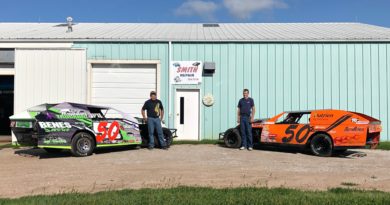Road maintainers must move with traffic
Thayer County Commissioners are enforcing a longtime state law that determines how road graders and other construction equipment must move along roadways. With the traffic is the only acceptable way says a new resolution signed into effect last week during the regular meeting of the county officials.
The Nebraska Intergovernmental Risk Management Association (NIRMA), a not-for-profit, member-owned and operated risk management and self-insurance pool designed by and expressly for Nebraska counties, is pushing the issue, says Thayer County Roads Supervisor Richard Heinrichs. “They basically said there is too much liability for graders to go against traffic, and in legal cases, they won’t be able to defend drivers.”
In fact, NIRMA released a letter to county road departments across the state a couple of months ago stating the liability issue as the most costly in cases involving accidents with civilian drivers and county workers who operate large equipment in traffic.
“Due to numerous head-on collisions with snow removal and other road maintenance equipment over the past 10 or 15 years resulting in serious injuries and very large lawsuits, it is imperative that counties and other governmental entities adopt and enforce policies against the practice that has been performed since horses pulled road graders,” states the letter penned by NIRMA road safety and loss prevention specialist Tim Baxter. He goes on to say that while it is hard to get road department employees to change the way they maintain roads, it is virtually impossible to win a case when an accident occurs while maintaining roads against traffic.
“The only way large equipment can legally move against traffic,” Heinrichs said, “is by placing barricades at both ends to completely stop all traffic from entering the roadway.” Which, he adds, although time consuming and costly, may have to be looked at as an option to abide by the rules of the resolution. “Productivity is going to go down no matter what,” he said. “Each driver can maintain about 12 to 15 miles a day right now, but with the change, that number drops to 7 or 8 miles as we’ll have to make passes along the roads without the blade down.”
In fact, Baxter points to this issue in the letter stating, “Signing and changing maintenance procedures could and will result in more deadheading which costs more money on already tight road budgets. But,” he adds, “counties should not place their employees in situations where taxpayers could be hurt or killed as well as placing county employees in harm’s way.”
While the movement of large equipment in traffic has been outlined in state laws for many years, it’s always sort of been left up to county officials to run their own road departments as efficiently as possible, Heinrichs said. Until recently. Large lawsuits have forced NIRMA to crack down on the departments to obey the laws. “Which we intend to do,” he said.
Lately the roads supervisor has been working out ways to possibly ease some of the added costs such as the additional fuel that will be needed for the extra passes. “Spraying weeds might come into play more,” he said and added that right now the graders keep the roads weed free. “Sometimes a road doesn’t necessarily need to be graded, but is getting overgrown with weeds. If we keep the weeds down by spraying, we won’t need to grade as often.”
In the meantime, drivers are asked to be cautious around maintenance workers grading roads if they must drive on the same road as the graders, and to realize that the large machinery will be on a single road much longer than before.



